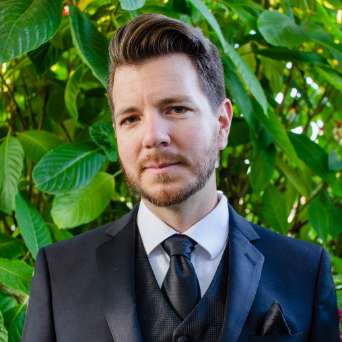In Hollywood, the bigger, the better. Saturday night’s compelling double bill of Puccini’s Gianni Schicchi and Leoncavallo’s Pagliacci owes its genesis to two legends of film: Woody Allen and Franco Zeffirelli. It’s hard to imagine two vastly different luminaries of film to converge upon the operatic stage but the two revivals that opened Los Angeles Opera’s season Saturday embody their creators acutely. Yet there was one wild card that differentiated the operas in a most intriguing way: the irrepressible Plácido Domingo.
The old maestro was undertaking the title character in Puccini’s charming comedy for the first time, as well as conducting Pagliacci in the second half. For LA audiences, this was a typical affair. The septuagenarian seems unstoppable at this point and often, this is to the audience’s benefit. Yet, Saturday’s Gianni Schicchi owes only part of its success to Domingo.
The charm of Gianni Schicchi was in the melding of Puccini’s drama with Allen’s pastiche, complete with a comically absurd film title sequence prior to the curtain. If one were to craft an opera out of a caricature of Italian culture, Allen’s telling of Schicchi would surely be it. And somewhat surprisingly, it worked.
Puccini’s characters were brought to life by Allen in amusing was: a boy (Gherardino) smacked upside his head by his dominating parents, a bleach blond floozy (La Ciesca), and an oversexed, slender Lauretta in heels. Yet, as it is so often, the focus was on Domingo. This rascal was a cigarette smoking, craps shooting, overcoat wearing caricature of an Italian patriarch in early 20th century Florence. Vocally, this was not his most successful foray into baritone territory. He often sounded gruff, declamatory and underpowered. Yet there is something to be said for Domingo’s dramatic instincts which proved, once again, to be incomparable. Despite the amended ending, which fit into Allen’s narrative more than Puccini’s, Domingo brought a tangible charm to the role and his rare entry into comic territory was exceptionally rewarding in the character’s magnanimity.
The rest of the cast was led by Arturo Chacón-Cruz as Rinuccio who, while slightly underpowered, possesses a tenor of exceptional sweetness and complex color. Andriana Chuchman as Lauretta sang a beguiling “O mio babbino caro” that was a highlight of the evening. Meridth Arwady as Zita was hilarious with a burly low mezzo voice. Simone, a Teddy Roosevelt look alike, was sung by Craig Colclough with an assured, pomous air.
Kathleen Smith Belcher’s stage direction was comically astute and the timing of which was executed exceptionally well by all involved. At some points it was as if the Marx Brothers met Puccini and Puccini proved all the better by such an encounter. Grant Gershon led the forces with a bit too easy a manner, but kept the tricky ensembles aligned and always proved sensitive to his soloists on stage.
The second half of the evening found Domingo in the pit for Zeffirelli’s over-the-top Pagliacci. Where the Allen vision proved congruous with the Puccini, Zeffirelli took excess to another level. The large cast of singers, chorus, supers and acrobats jammed the stage in front of the garish sets (apparently under a freeway) and provided action to the point where it was unclear where to look. And when the music provided focus, Zeffirelli and his stage director Stefano Trespidi seemed intent on taking it away. Even during the most explicitly direct moments, such as “Stridono lassù” (sung bewitchingly by Ana María Martínez), the skating of a rollerblader upstage, or action of Nedda literally flapping her arms with the neighborhood children proved to be more than distracting. And while the menagerie of acrobats and performers belonging to the traveling troupe were initially amusing, their persistent use wore out their novelty.
The cast contained singing highlights of the evening, primarily with the aforementioned Martínez whose Nedda was exceptionally strong. Martínez’s steely soprano is an instrument that is foreboding yet achingly beautiful. Her lover Silvio was sung by Liam Bonner, a dashing presence with an equally charming baritone. The tragic Canio was sung by Marco Berti who gave it his all, and while he produced some stentorian tones above the passaggio, swooped to get there. Still, it was a dramatically potent reading. George Gagnidze was better suited to the conniving antics of Tonio rather than the majestic conclusion of the “Prologue.” Domingo led the performance with a fine instinct for pacing, but could have used more tension in pivotal transitions. The LA Opera Chorus sang with vivacity and were an indispensable part of the drama.
And while the Zeffirelli was excessive, the overall impact of the evening was nonetheless undeniable. The influence of Hollywood in opera is undeniable and, as was seen particularly in the Puccini, the results are often for the better.




